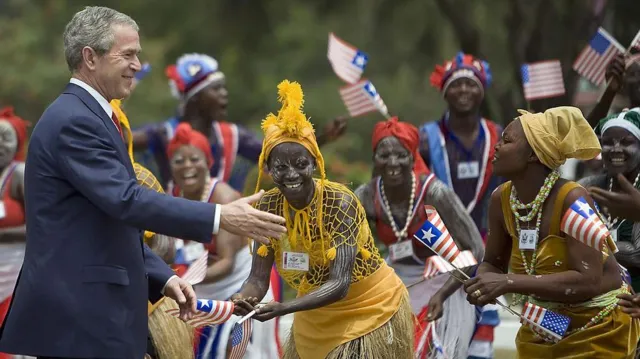Liberia: A Nation Forged in American History and Culturally Bound to the US
In a recent interaction, US President Donald Trump commented on Liberian President Joseph Boakai’s proficiency in English, inquiring about his educational background. While the remark highlighted a linguistic connection, it underscored a deeper, centuries-old relationship between Liberia and the United States—a bond rooted in shared history, culture, and even language.
Liberia’s story is intrinsically linked to the legacy of slavery and the quest for freedom in America. Founded in 1822 by freed African-American slaves and later settled by Africans rescued from slave ships, Liberia declared its independence in 1847. This unique genesis has profoundly shaped its national identity, institutions, and cultural landscape, leading to a distinctively American inflection in its society.
The historical ties are so significant that English remains Liberia’s official language, and many Liberians speak with an accent reminiscent of American English. This historical narrative is rich with influential figures, striking cultural parallels, and a shared heritage that warrants a closer look.
A Nation Founded by Freed Slaves
The United States played a pivotal role in Liberia’s establishment. The American Colonization Society (ACS), an organization dedicated to resettling free-born African Americans and liberated slaves, was instrumental in the founding of Liberia. This era saw thousands of Black Americans and Africans liberated from the transatlantic slave trade find a new home in West Africa. The influence of this period is palpable, with Liberian culture, institutions, and even its governance structures bearing a strong African-American imprint. Reflecting this deep connection, ten of Liberia’s twenty-six presidents were born in the United States, a testament to the enduring legacy of American involvement in the nation’s formative years.
Monrovia: A Capital Named in Honor of an American President
Liberia’s capital city, Monrovia, is named in tribute to James Monroe, the 5th President of the United States. President Monroe was a staunch advocate for the ACS and its mission to resettle freed slaves in Africa. The city’s early architecture also mirrored American styles, further cementing the historical ties. Street names within Monrovia often honor prominent American historical figures, serving as constant reminders of the nation’s unique origins and its deep-rooted relationship with the US.
Remarkable Parallels: The Flags of Liberia and the United States
Perhaps one of the most striking visual representations of Liberia’s connection to the US is found in its national flag. The Liberian flag features eleven alternating red and white stripes and a blue square containing a single white star. This design is remarkably similar to the flag of the United States, which has thirteen stripes and fifty stars. The Liberian flag’s design symbolically represents Liberia as the first independent republic in Africa, while the single star mirrors the US flag’s representation of unity. The flag was notably designed by seven women of African-American descent, further emphasizing the shared heritage.
A Shared Passion for Football: From Liberian Legend to US National Team
The influence extends to the world of sports, particularly football. Timothy Weah, son of Liberia’s football icon and former president George Weah, is a prominent figure in international football. Although born in New York, Timothy plays for the US national team and currently represents Italian club Juventus. His father, George Weah, is a celebrated Liberian legend who achieved global acclaim, including winning the Ballon d’Or in 1995. His success as the sole African recipient of this prestigious award highlights Liberia’s significant contribution to the sport and its global reach.
Ellen Johnson Sirleaf: A Nobel Laureate President
Liberia has also made significant strides in leadership, notably producing Africa’s first elected female president, Ellen Johnson Sirleaf. Serving from 2006 to 2018, her tenure followed the nation’s devastating civil war. Sirleaf’s background is deeply intertwined with American academia, having studied at Madison Business College and earned an economics degree from Harvard University. Her leadership was recognized globally, culminating in the 2011 Nobel Peace Prize, shared with Leymah Gbowee and Tawakkul Karmān, for their non-violent struggle for the safety of women and for women’s rights to full participation in peace-building work. In 2016, Forbes recognized her among the world’s most powerful women, underscoring her impactful leadership on the global stage.
Reactions to President Trump’s Remarks
President Trump’s comments on President Boakai’s English have elicited a range of reactions within Liberia. Some, like accountant Joseph Manley, feel that the US President should have been better briefed on Liberia’s history, emphasizing that English is the country’s official language and that Liberia possesses a rich educational heritage. Others, such as human resources professional Henrietta Peter-Mogballah, view the surprise as indicative of a wider global ignorance regarding African nations and their people. She notes that external perceptions are often clouded by negative stereotypes of war, poverty, and lack of education.
However, not all reactions have been critical. Lawyer and politician Kanio Gbala suggests that President Trump’s remark could be interpreted as a genuine compliment on President Boakai’s command of the English language, without any inherent sarcasm. He posits that viewing the comment as disrespectful might stem from political biases.
These varied perspectives highlight the complex interplay of historical understanding, cultural perception, and political interpretation when discussing international relations.
Explore more from BBC Africa:
Follow us on Twitter @BBCAfrica, on Facebook at BBC Africa or on Instagram at bbcafrica.

